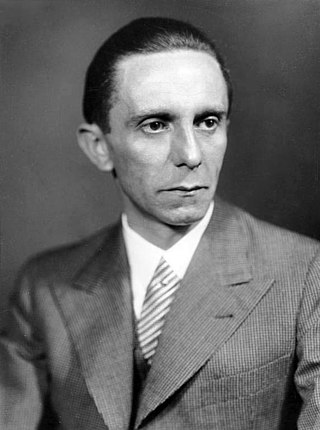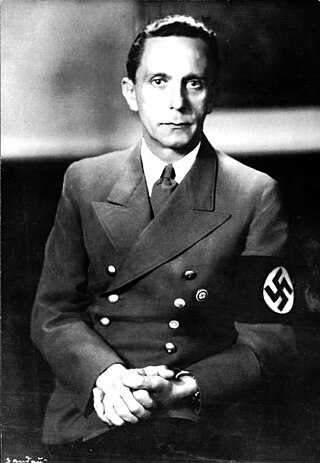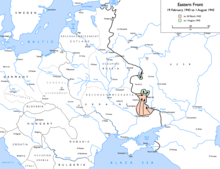
Heinrich Luitpold Himmler was a German politician who was the 4th Reichsführer of the Schutzstaffel, a leading member of the Nazi Party of Germany, and one of the most powerful men in Nazi Germany, primarily known for being a main architect of the Holocaust.

Paul Joseph Goebbels was a German philologist and Nazi politician who was the Gauleiter of Berlin, chief propagandist for the Nazi Party, and then Reich Minister of Propaganda from 1933 to 1945. He was one of Adolf Hitler's closest and most devoted followers, known for his skills in public speaking and his deeply virulent antisemitism which was evident in his publicly voiced views. He advocated progressively harsher discrimination, including the extermination of the Jews in the Holocaust.

Nazi Germany, officially known as the German Reich and later the Greater German Reich, is a term used to describe the German state between 1933 and 1945, when Adolf Hitler and the Nazi Party controlled the country, transforming it into a totalitarian dictatorship. The Third Reich, meaning "Third Realm" or "Third Empire", referred to the Nazi claim that Nazi Germany was the successor to the earlier Holy Roman Empire (800–1806) and German Empire (1871–1918). The Third Reich, which the Nazis referred to as the Thousand-Year Reich, ended in May 1945, after only 12 years, when the Allies defeated Germany and entered the capital, Berlin, ending World War II in Europe.

Total war is a type of warfare that includes any and all civilian-associated resources and infrastructure as legitimate military targets, mobilises all of the resources of society to fight the war, and gives priority to warfare over non-combatant needs.

The Wannsee Conference was a meeting of senior government officials of Nazi Germany and Schutzstaffel (SS) leaders, held in the Berlin suburb of Wannsee on 20 January 1942. The purpose of the conference, called by the director of the Reich Security Main Office SS-Obergruppenführer Reinhard Heydrich, was to ensure the co-operation of administrative leaders of various government departments in the implementation of the Final Solution to the Jewish Question, whereby most of the Jews of German-occupied Europe would be deported to occupied Poland and murdered. Conference participants included representatives from several government ministries, including state secretaries from the Foreign Office, the justice, interior, and state ministries, and representatives from the SS. In the course of the meeting, Heydrich outlined how European Jews would be rounded up and sent to extermination camps in the General Government, where they would be killed.

The Reich Security Main Office was an organization under Heinrich Himmler in his dual capacity as Chef der Deutschen Polizei and Reichsführer-SS, the head of the Nazi Party's Schutzstaffel (SS). The organization's stated duty was to fight all "enemies of the Reich" inside and outside the borders of Nazi Germany.

The Holocaust—the murder of about six million Jews by Nazi Germany from 1941 to 1945—is the most-documented genocide in history. Although there is no single document which lists the names of all Jewish victims of Nazi persecution, there is conclusive evidence that about six million Jews were murdered. There is also conclusive evidence that Jews were gassed at Auschwitz-Birkenau, the Operation Reinhard extermination camps, and in gas vans, and that there was a systematic plan by the Nazi leadership to murder them.
The New Order of Europe was the political and social system that Nazi Germany wanted to impose on the areas of Europe that it conquered and occupied.
The functionalism–intentionalism debate is a historiographical debate about the reasons for the Holocaust as well as most aspects of the Third Reich, such as foreign policy. It essentially centres on two questions:

Berlin Sportpalast was a multi-purpose indoor arena located in the Schöneberg section of Berlin, Germany. Depending on the type of event and seating configuration, the Sportpalast could hold up to 14,000 people and was for a time the biggest meeting hall in Berlin. The Sportpalast is most known for speeches and rallies that took place during Nazi Germany, particularly Propaganda Minister Joseph Goebbels's 1943 "Total War" speech.

The propaganda used by the German Nazi Party in the years leading up to and during Adolf Hitler's dictatorship of Germany from 1933 to 1945 was a crucial instrument for acquiring and maintaining power, and for the implementation of Nazi policies.

Untermensch is a German language word literally meaning 'underman', 'sub-man', or 'subhuman', that was extensively used by Germany's Nazi Party to refer to non-Aryan people they deemed as inferior. It was mainly used against "the masses from the East", that is Jews, Roma, and Slavs.

The Posen speeches were two speeches made by Heinrich Himmler, the head of the SS of Nazi Germany, on 4 and 6 October 1943 in the town hall of Posen (Poznań), in German-occupied Poland. The recordings are the first known documents in which a member of the Hitler Cabinet spoke of the ongoing extermination of the Jews in extermination camps. They demonstrate that the German government wanted, planned, and carried out the Holocaust.

The Reich Ministry for Public Enlightenment and Propaganda, also known simply as the Ministry of Propaganda, controlled the content of the press, literature, visual arts, film, theater, music and radio in Nazi Germany.

Wehrmachtbericht was the daily Wehrmacht High Command mass-media communiqué and a key component of Nazi propaganda during World War II. Produced by the Propaganda Department of the OKW, it covered Germany's military situation and was broadcast daily on the Reich Broadcasting Corporation of Nazi Germany. All broadcasts were authorized by the Reich Ministry of Propaganda under Joseph Goebbels. Despite the latter's attempts to temper excessive optimism, they often exaggerated the success of the German armed forces, the Wehrmacht, leading historian Aristotle Kallis to describe their tone as "triumphalist".
The Reich Chancellery meeting of 12 December 1941 was an encounter between Adolf Hitler and the highest-ranking officials of the Nazi Party. Almost all important party leaders were present to hear Hitler declare the ongoing destruction of the Jewish race, which culminated in the Holocaust. The meeting is less known than the later Wannsee Conference.

The propaganda of the Nazi regime that governed Germany from 1933 to 1945 promoted Nazi ideology by demonizing the enemies of the Nazi Party, notably Jews and communists, but also capitalists and intellectuals. It promoted the values asserted by the Nazis, including Heldentod, Führerprinzip, Volksgemeinschaft, Blut und Boden and pride in the Germanic Herrenvolk. Propaganda was also used to maintain the cult of personality around Nazi leader Adolf Hitler, and to promote campaigns for eugenics and the annexation of German-speaking areas. After the outbreak of World War II, Nazi propaganda vilified Germany's enemies, notably the United Kingdom, the Soviet Union and the United States, and in 1943 exhorted the population to total war.

The Reich Plenipotentiary for the Total War Effort was a position created by Adolf Hitler, the Führer ("leader") of Nazi Germany, on 23 July 1944 for Joseph Goebbels, who was also at the time the regime's Propaganda Minister. The purpose of the new office was to rally the German people behind an effort to achieve "total war", in which all civilian resources and all aspects of civilian infrastructure are subordinated to the needs of the military and the war effort. The idea to create the new office, and to appoint Goebbels to it, had come from Goebbels himself. Hitler had acceded to it because of the rapid deterioration of the German military position in the war in the East against the Soviet Union; he had finally been convinced that only a total war effort could counter what Hitler felt was the constant undermining of his military strategies by his generals.

During a speech at the Reichstag on 30 January 1939, Adolf Hitler threatened "the annihilation of the Jewish race in Europe" in the event of war:
If international finance Jewry inside and outside Europe should succeed in plunging the nations once more into a world war, the result will be not the Bolshevization of the earth and thereby the victory of Jewry, but the annihilation of the Jewish race in Europe.

On 30 January 1939, Nazi German dictator Adolf Hitler gave a speech in the Kroll Opera House to the Reichstag delegates, which is best known for the prediction he made that "the annihilation of the Jewish race in Europe" would ensue if another world war were to occur.


















